Python是进行数据分析的一种出色语言,主要是因为以数据为中心的python软件包具有奇妙的生态系统。 Pandas是其中的一种,使导入和分析数据更加容易。
Pandas dataframe.shift()函数根据需要的周期数移动索引,并带有可选的时间频率。该函数采用称为周期的标量参数,该参数表示要在所需轴上进行的平移次数。处理时间序列数据时,此函数非常有用。
用法:DataFrame.shift(periods=1, freq=None, axis=0)
参数:
periods: Number of periods to move, can be positive or negative
freq: DateOffset, timedelta, or time rule string, optional Increment to use from the tseries module or time rule (e.g. ‘EOM’). See Notes
axis: {0 or ‘index’, 1 or ‘columns’}
返回:shifted:DataFrame
范例1:采用shift()在时间序列数据中将索引轴移动2个周期的函数
# importing pandas as pd
import pandas as pd
# Creating row index values for our data frame
# We have taken time frequency to be of 12 hours interval
# We are generating five index value using "period = 5" parameter
ind = pd.date_range('01 / 01 / 2000', periods = 5, freq ='12H')
# Creating a dataframe with 4 columns
# using "ind" as the index for our dataframe
df = pd.DataFrame({"A":[1, 2, 3, 4, 5],
"B":[10, 20, 30, 40, 50],
"C":[11, 22, 33, 44, 55],
"D":[12, 24, 51, 36, 2]},
index = ind)
# Print the dataframe
df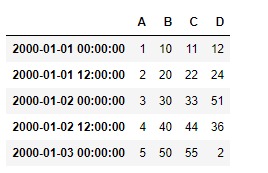
让我们使用dataframe.shift()使索引轴向正方向移动2个周期的函数
# shift index axis by two periods in positive direction
# axis = 0 is set by default
df.shift(2, axis = 0)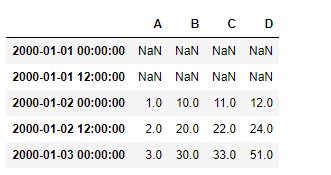
让索引轴在负方向上移动一段时间
# shift index axis by two periods in negative direction
# axis = 0 is set by default
df.shift(-2, axis = 0)输出:
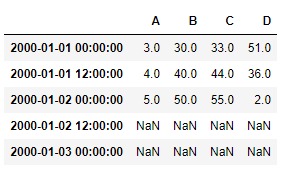
范例2:采用shift()用于在时间序列数据中将列轴移动2个周期
# importing pandas as pd
import pandas as pd
# Creating row index values for our data frame
# We have taken time frequency to be of 12 hours interval
# We are generating five index value using "period = 5" parameter
ind = pd.date_range('01 / 01 / 2000', periods = 5, freq ='12H')
# Creating a dataframe with 4 columns
# using "ind" as the index for our dataframe
df = pd.DataFrame({"A":[1, 2, 3, 4, 5],
"B":[10, 20, 30, 40, 50],
"C":[11, 22, 33, 44, 55],
"D":[12, 24, 51, 36, 2]},
index = ind)
# Print the dataframe
df
让我们使用dataframe.shift()沿正方向将列轴移动2个周期的函数
# shift column axis by two periods in positive direction
df.shift(2, axis = 1)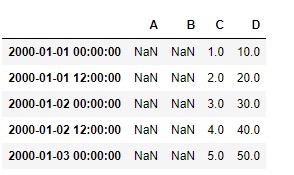
让列轴在负方向上移动一段时间
# shift column axis by two periods in negative direction
df.shift(-2, axis = 0)输出:
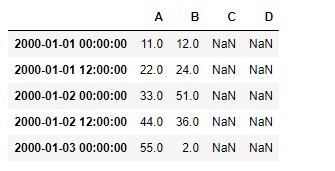
相关用法
- Python pandas.map()用法及代码示例
- Python Pandas Series.str.len()用法及代码示例
- Python Pandas.factorize()用法及代码示例
- Python Pandas TimedeltaIndex.name用法及代码示例
- Python Pandas dataframe.ne()用法及代码示例
- Python Pandas Series.between()用法及代码示例
- Python Pandas DataFrame.where()用法及代码示例
- Python Pandas Series.add()用法及代码示例
- Python Pandas.pivot_table()用法及代码示例
- Python Pandas Series.mod()用法及代码示例
- Python Pandas Dataframe.at[ ]用法及代码示例
- Python Pandas Dataframe.iat[ ]用法及代码示例
- Python Pandas.pivot()用法及代码示例
- Python Pandas dataframe.mul()用法及代码示例
- Python Pandas.melt()用法及代码示例
注:本文由纯净天空筛选整理自Shubham__Ranjan大神的英文原创作品 Python | Pandas dataframe.shift()。非经特殊声明,原始代码版权归原作者所有,本译文未经允许或授权,请勿转载或复制。
